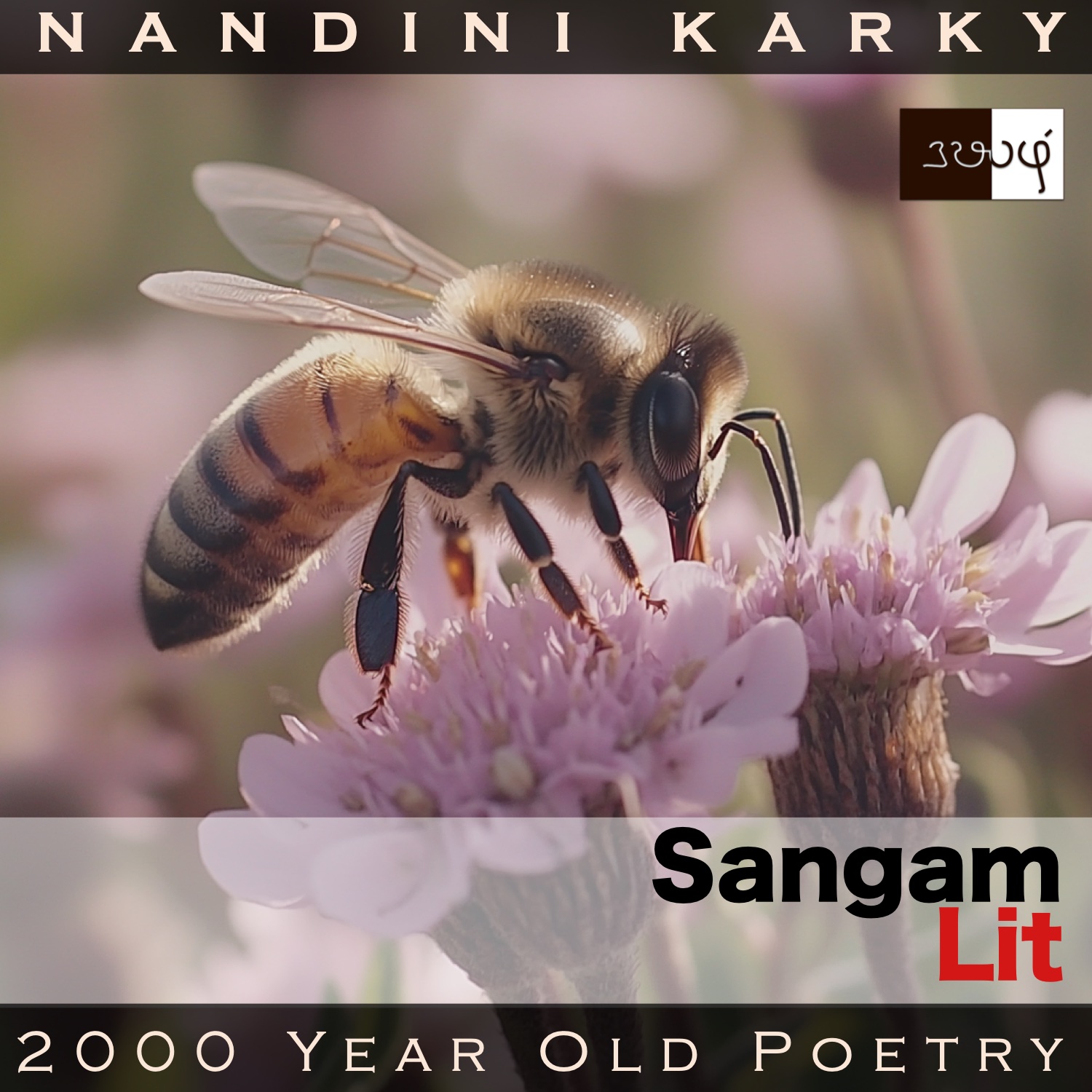Podcast: Play in new window | Download
Subscribe: Apple Podcasts | Spotify | Amazon Music | Android | iHeartRadio | TuneIn | RSS | More
In this episode, we perceive the ire of a lady towards her man, as portrayed in Sangam Literary work, Kalithogai 66, penned by Maruthan Ilanaakanaar. The verse is situated in the ‘Marutham’ or ‘Farmlands landscape’ and sketches the escapades of the man with courtesans.

வீங்கு நீர் அவிழ் நீலம் பகர்பவர் வயற் கொண்ட
ஞாங்கர் மலர் சூழ்தந்து, ஊர் புகுந்த வரி வண்டு,
ஓங்கு உயர் எழில் யானைக் கனை கடாம் கமழ் நாற்றம்
ஆங்கு அவை விருந்து ஆற்ற, பகல் அல்கி, கங்குலான்,
வீங்கு இறை வடு கொள, வீழுநர்ப் புணர்ந்தவர்
தேம் கமழ் கதுப்பினுள் அரும்பு அவிழ் நறு முல்லை
பாய்ந்து ஊதி, படர் தீர்ந்து, பண்டு தாம் மரீஇய
பூம் பொய்கை மறந்து, உள்ளாப் புனல் அணி நல் ஊர!
அணை மென் தோள் யாம் வாட, அமர் துணைப் புணர்ந்து நீ,
‘மண மனையாய்’ என வந்த மல்லலின் மாண்பு அன்றோ
பொதுக் கொண்ட கவ்வையின் பூ அணிப் பொலிந்த நின்
வதுவை அம் கமழ் நாற்றம் வைகறைப் பெற்றதை?
கனலும் நோய்த் தலையும், ‘நீ கனங் குழையவரொடு
புனல் உளாய்’ என வந்த பூசலின் பெரிது அன்றோ
தார் கொண்டாள் தலைக் கோதை தடுமாறிப் பூண்ட நின்
ஈரணி சிதையாது, எம் இல் வந்து நின்றதை?
தணந்ததன் தலையும், ‘நீ தளரியலவரொடு
துணங்கையாய்’ என வந்த கவ்வையின் கடப்பு அன்றோ
ஒளி பூத்த நுதலாரோடு ஓர் அணிப் பொலிந்த நின்
களி தட்ப வந்த இக் கவின் காண இயைந்ததை?
என ஆங்கு,
அளி பெற்றேம்; எம்மை நீ அருளினை; விளியாது
வேட்டோர் திறத்து விரும்பிய நின் பாகனும்,
‘நீட்டித்தாய்’ என்று, கடாஅம் கடுந் திண் தேர்;
பூட்டு விடாஅ நிறுத்து.
Here we are enter new territory with this verse, and in this first step into the fertile agricultural towns, we listen to the lady’s voice. The words can be translated as follows:
“Enticed by blue lotuses in copious waters that have been plucked by sellers, a striped bee parts from its home and buzzes around flowers blooming in the fields nearby and enters inside town. There, it feasts on the fragrance of musth, oozing copiously from a tall and handsome elephant, resting there by day. Then at night, as maiden unite with their beloved, leaving imprints of bangles on their thick wrists, the bee buzzes around the fragrant jasmine buds, glowing on their honey-fragrant tresses. Feeding so, ending its desire, the bee thinks not about the flower-filled pond that it called as home in the past, in your good town, filled with flowing streams, O lord!
Hasn’t the news, that leaving my soft arms to fade, you had left to unite with your desirable mate, and were living with her at her home, attained complete glory, when I take in the scent of your slanderous and fragrant union with those flower-clad common maiden, at dawn?
Hasn’t the uproar, that arose, when leaving me in a fever, filled with suffering, you were playing in the stream with maiden wearing heavy earrings, been exceeded, when depicting how in confusion you took to wearing her head garland around your shoulders and how she took your neck garland, reflecting both your fused forms so clearly, you stand here in my home?
Hasn’t the gossip, that arrived, when after leaving me, you were dancing ‘thunangai’ with those maiden, akin to tender shoots, been surpassed, when I can see the beauty of your state, brimming with ecstasy, echoing your inseparable union with those maiden having radiant foreheads?
And so, saying these words, I have attained your attention; You have showered your grace too; But tarry no more, for your charioteer, intending to take you to those whom you desire ceaselessly, thinking, ‘He won’t be long here’, stands there holding the reins of your fast and sturdy chariot, without even untying the horses!”
Time to explore the nuances. The verse is situated in the context of a man’s parting from his lady after marriage, seeking the company of courtesans. The words here are rendered by the lady to her man. The lady starts by sketching the activities of a bee to describe the man’s town. She talks about how the bee leaves the copious waters of its pond and travels along with the sellers of blue-lotuses, buzzes around flowers in the field and enters inside town. Then, all day, it delights in buzzing around the musth juices flowing from an elephant. At night, it journeys inside the homes of maiden delighting with their beloved and buzzes around the jasmine buds in their tresses. In this fashion, this bee completely forgets its home of the pond, the lady describes, to talk about the man’s town. There is a significance to this description, which we will explore in a short while.
The lady then talks about how the man can stayed for long in a courtesan’s home, played in the stream with her and danced the thunangai too. She had heard news about all this, but the state of the man as he stood there before her at dawn, wafting with the scent of his union with the courtesan, with exchanged garlands, and full of ecstasy of having enjoyed the courtesan’s company, seemed to transcend the glory of that slanderous news that reached her. The lady concludes saying to the man, ‘Yes, you have come here, heard these words, and rendered your grace. Now, don’t delay any longer. For I can see how your charioteer is waiting to take you back to the courtesans, thinking ‘my lord will not take long at his home’, as clearly evident from the way he stands all ready, reins in hand, without even letting the horses to graze!’
A verse brimming with sarcasm, reflecting the fury of a woman scorned. The description of the bee buzzing everywhere and forgetting its home is a clear metaphor for the man forsaking the lady’s home and seeking the delights of being with courtesans. Here is the first glimpse of the ‘Sulk’ country, where the man, the lord of the fertile town, owner of many riches, parts away from his beloved wife to seek the pleasures of courtesans, and then comes back at times to be showered with her wrath!




Share your thoughts...